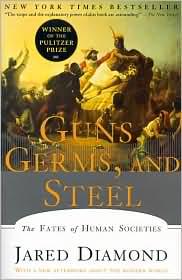
All rights reserved. Copyright © 1997 by W.W. Norton & Company. Cover painting: Sir John Everett Millais, Pizarro seizing the Inca of Peru, 1845. Victoria and Albert Museum, London.
The copyright holder reserves, or holds for their own use, all the rights provided by copyright law, such as distribution, performance, and creation of derivative works.
Diamond, Jared. Guns, Germs and Steel: The Fates of Human Societies. New York: W. W. Norton, 1997.
Jared Diamond reports that during his field work in Papua New Guinea, a local politician named Yali asked him why Europeans had so much cargo, or material goods, while New Guineans had so little. Yali’s question was the catalyst for the Pulitzer Prize winning book Guns, Germs, and Steel. Diamond argues that all humans have the intellectual capability to build advanced societies, but only those who have historically had access to the right kind of plants and animals for domestication have been successful in doing so. In short, environmental differences are decisive. Although advanced societies are not exclusive to Europe, it is the European experience of domesticating animals and exposure to associated diseases that gave Europe the upper hand when conquering the New World. While opinion remains divided as to the significance of the charge of geographic determinism, a charge that Diamond himself reflects upon in the book’s prologue and epilogue, the remarkable success of the book is beyond dispute.
Jared Diamond is professor of geography at UCLA.
- Diamond, Jared. Collapse: How Societies Choose to Fail or Succeed. New York: Viking, 2005.
- Mitchell, John Ames. "The Last American: A Fragment from the Journal of Khan-Li, Prince of Dimph-Yoo-Chur and Admiral in the Persian Navy". Illustrated by John Ames Mitchell and F.W. Read. New York: Frederick A. Stokes, 1902.

